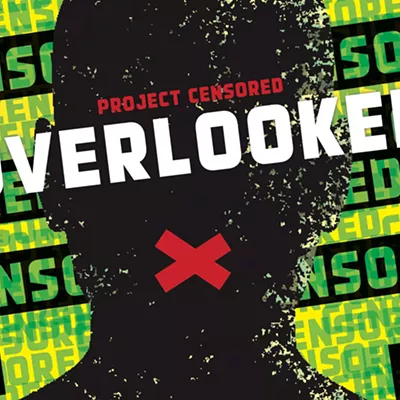This Party's Over
[
{
"name": "Broadstreet - Instory",
"component": "25846487",
"insertPoint": "4",
"requiredCountToDisplay": "4"
},{
"name": "Broadstreet - Empower Local",
"component": "27852456",
"insertPoint": "8",
"requiredCountToDisplay": "8"
},{
"name": "Broadstreet - Instory",
"component": "25846487",
"insertPoint": "12",
"requiredCountToDisplay": "12"
},{
"name": "Broadstreet - Instory - 728x90 / 970x250",
"component": "27852677",
"insertPoint": "18",
"requiredCountToDisplay": "18"
},{
"name": "Broadstreet - Instory",
"component": "25846487",
"insertPoint": "5th",
"startingPoint": "23",
"requiredCountToDisplay": "24",
"maxInsertions": 100
}
]
by ROBERT STOKES & r & & r & & lt;span class= "dropcap " & "V & lt;/span & oters split three to one against Bush." So said a Nov. 1, ABC/Washington Post poll. Seventy-five percent of voters said America needs to "elect a president who can set the nation in a new direction." Twenty-three percent said, "We need to keep the country moving in the direction [President] Bush has been taking us." Two percent were undecided.
Other Bush-related polls peg the President's support in the 30s, opposition in the 50s and 60s.
Polls never tell the whole political story. But numbers that dramatic send an unmistakable message -- voters across the political spectrum have turned against President Bush. In 2006, Democrats and independents expressed that disapproval by voting against Republicans at federal, state and local levels. Anti-Bush Republicans and conservatives did so by staying home.
Next year's Republican candidates would well serve their nation (and themselves) by joining the bipartisan anti-Bush movement. They should also distance themselves from the major cause of current GOP woes -- the Bush administration-crafted foreign and domestic policies collectively known as the "Global War on Terror."
Internal GOP politics might make it easier for Republicans to just let the clock run out, then pretend Bush never existed, or that he came from another planet. Unfortunately, the voters know better. President Bush won office by gaining support from Republicans everywhere, including Washington Republicans -- including me.
It's time to acknowledge our mistake. GOP leaders can learn the easy way, from polls and other indicators of public opinion, or the hard way (again) from voter rejection. Last year's GOP debacle crushed an admirable U.S. Senate candidate, Mike McGavick, and halved Rep. Cathy McMorris-Rodgers' substantial first-term victory margin. The anti-Bush national trend contributed to the defeat of many other Washington state and Spokane-area Republicans, including 6th District legislators Brad Benson and John Serben, and Spokane County Commissioner Phil Harris.
Global War on Terror zealots will say, "The Muslims attacked us! What else could President Bush do?" Nonsense! If Muslims attacked America on 9/11, then Americans fought Christians in 1775 and 1812 (British), 1846 (Mexicans), 1861 (Confederates), 1898 (Spanish) and 1917/1941 (Germans).
If we must blame particular Islamic nations, Saudi Arabia would be a prime candidate, as home to 15 of the 19 hijackers and their leader Osama bin Laden. The other culprit nation was Afghanistan, where al-Qaeda was closely affiliated with the Taliban government and where 9/11 attack plans were reportedly developed.
So Bush attacks Afghanistan (some justification), mires us in a guerrilla war in Iraq (no 9/11 involvement) and pounds the war drum against Iran (also no 9/11 involvement). He had other options. My choice would have been condemning the 9/11 attacks as particularly vicious crimes, then directing law enforcement agencies to pursue the responsible individuals and criminal organizations, notably Osama bin Laden and al-Qaeda. U.S. agencies should have worked with counterparts in other nations and international organizations. Necessary supporting military measures should have been conducted under international sanction.
I initially resisted joining Democrats and liberals in blaming a Republican president for the anti-Muslim hysteria following 9/11. I still hoped for conservative reform during the era of all-Republican government begun by the election of Bush in 2000. I also believed (and still believe) the media and public, including many Democrats, bore a share of responsibility for the post-9/11 frenzy over terrorism. (I expressed that in The Inlander of Feb. 20, 2003.)
My breaking point came a few months later, when presidential political advisor Karl Rove openly bragged about running his boss as the "Warrior President" in 2004. The breaking point for many other Americans was enactment of the 2006 Military Commissions Act, an affront to civil liberties (notably habeas corpus) proposed by Bush and approved by the GOP-controlled Congress. That law was cheered by (some) conservative commentators who hoped it would help GOP Congressional candidates. Instead, voter revulsion ended Republican control along with many GOP political careers.
& lt;span class= "dropcap " & P & lt;/span & ower denies some politicians the ability to deal with adversity. When Hitler's 1939 invasion of Poland repudiated British Prime Minister Neville Chamberlain's appeasement policy, the rules of British parliamentary democracy clearly demanded his resignation. Nevertheless, he resisted until a delegation of his own Conservative Party leaders threatened to march on his 10 Downing Street office. World War II ended with an equally delusional Adolf Hitler plotting a second German invasion of the USSR -- as Russian tanks rolled into Berlin.
Sadly, political realism suggests most Republican candidates will conduct their 2008 campaigns under the banner of an also failed and increasingly delusional leader. For those loyal soldiers, next year's task will be personal survival in the path of an almost inevitable Democratic landslide.
Then what? From a conservative/Republican perspective, many grisly possibilities come to mind. And one pleasant one. Another Republican wipeout year was 1964 -- my first voting year. From the ashes of Barry Goldwater's landslide defeat grew the thoughtful, cautious, skeptical-of-government conservatism I grew up with and have worked for since.
This once-young, now-old Goldwater conservative does not relish the likely outcome of Campaign 2008. However, good politics must be about hope, not fear, anger or despair. My hope is that the departure of George W. Bush and his rapidly shrinking cadre of "Warrior Republicans" will signal my party's return to its earlier, wiser traditions.
Robert Stokes is a retired professor who lives in Spokane. He can be reached at [email protected]
Other Bush-related polls peg the President's support in the 30s, opposition in the 50s and 60s.
Polls never tell the whole political story. But numbers that dramatic send an unmistakable message -- voters across the political spectrum have turned against President Bush. In 2006, Democrats and independents expressed that disapproval by voting against Republicans at federal, state and local levels. Anti-Bush Republicans and conservatives did so by staying home.
Next year's Republican candidates would well serve their nation (and themselves) by joining the bipartisan anti-Bush movement. They should also distance themselves from the major cause of current GOP woes -- the Bush administration-crafted foreign and domestic policies collectively known as the "Global War on Terror."
Internal GOP politics might make it easier for Republicans to just let the clock run out, then pretend Bush never existed, or that he came from another planet. Unfortunately, the voters know better. President Bush won office by gaining support from Republicans everywhere, including Washington Republicans -- including me.
It's time to acknowledge our mistake. GOP leaders can learn the easy way, from polls and other indicators of public opinion, or the hard way (again) from voter rejection. Last year's GOP debacle crushed an admirable U.S. Senate candidate, Mike McGavick, and halved Rep. Cathy McMorris-Rodgers' substantial first-term victory margin. The anti-Bush national trend contributed to the defeat of many other Washington state and Spokane-area Republicans, including 6th District legislators Brad Benson and John Serben, and Spokane County Commissioner Phil Harris.
Global War on Terror zealots will say, "The Muslims attacked us! What else could President Bush do?" Nonsense! If Muslims attacked America on 9/11, then Americans fought Christians in 1775 and 1812 (British), 1846 (Mexicans), 1861 (Confederates), 1898 (Spanish) and 1917/1941 (Germans).
If we must blame particular Islamic nations, Saudi Arabia would be a prime candidate, as home to 15 of the 19 hijackers and their leader Osama bin Laden. The other culprit nation was Afghanistan, where al-Qaeda was closely affiliated with the Taliban government and where 9/11 attack plans were reportedly developed.
So Bush attacks Afghanistan (some justification), mires us in a guerrilla war in Iraq (no 9/11 involvement) and pounds the war drum against Iran (also no 9/11 involvement). He had other options. My choice would have been condemning the 9/11 attacks as particularly vicious crimes, then directing law enforcement agencies to pursue the responsible individuals and criminal organizations, notably Osama bin Laden and al-Qaeda. U.S. agencies should have worked with counterparts in other nations and international organizations. Necessary supporting military measures should have been conducted under international sanction.
I initially resisted joining Democrats and liberals in blaming a Republican president for the anti-Muslim hysteria following 9/11. I still hoped for conservative reform during the era of all-Republican government begun by the election of Bush in 2000. I also believed (and still believe) the media and public, including many Democrats, bore a share of responsibility for the post-9/11 frenzy over terrorism. (I expressed that in The Inlander of Feb. 20, 2003.)
My breaking point came a few months later, when presidential political advisor Karl Rove openly bragged about running his boss as the "Warrior President" in 2004. The breaking point for many other Americans was enactment of the 2006 Military Commissions Act, an affront to civil liberties (notably habeas corpus) proposed by Bush and approved by the GOP-controlled Congress. That law was cheered by (some) conservative commentators who hoped it would help GOP Congressional candidates. Instead, voter revulsion ended Republican control along with many GOP political careers.
& lt;span class= "dropcap " & P & lt;/span & ower denies some politicians the ability to deal with adversity. When Hitler's 1939 invasion of Poland repudiated British Prime Minister Neville Chamberlain's appeasement policy, the rules of British parliamentary democracy clearly demanded his resignation. Nevertheless, he resisted until a delegation of his own Conservative Party leaders threatened to march on his 10 Downing Street office. World War II ended with an equally delusional Adolf Hitler plotting a second German invasion of the USSR -- as Russian tanks rolled into Berlin.
Sadly, political realism suggests most Republican candidates will conduct their 2008 campaigns under the banner of an also failed and increasingly delusional leader. For those loyal soldiers, next year's task will be personal survival in the path of an almost inevitable Democratic landslide.
Then what? From a conservative/Republican perspective, many grisly possibilities come to mind. And one pleasant one. Another Republican wipeout year was 1964 -- my first voting year. From the ashes of Barry Goldwater's landslide defeat grew the thoughtful, cautious, skeptical-of-government conservatism I grew up with and have worked for since.
This once-young, now-old Goldwater conservative does not relish the likely outcome of Campaign 2008. However, good politics must be about hope, not fear, anger or despair. My hope is that the departure of George W. Bush and his rapidly shrinking cadre of "Warrior Republicans" will signal my party's return to its earlier, wiser traditions.
Robert Stokes is a retired professor who lives in Spokane. He can be reached at [email protected]
















